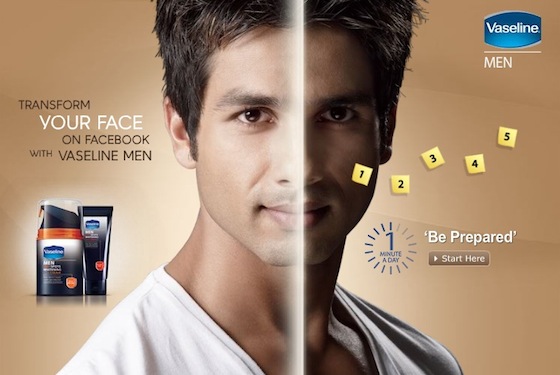A new Facebook app has been creating some controversy in India. The Facebook app [2], launched by Vaseline [3], is a product line owned by Unilever lets users lighten the skin colour on their profile pictures [4]. It is not the first time that desirability of ‘fairness’ has been discussed in the Indian blogosphere. However, the app in question promotes a product that targets men, which is a relatively new trend. So far, most fairness creams in the Indian market usually target female consumers. Le Sigh [5] observes:
The thing that strikes me most about this advertisement is that, it in fact focuses on the need for men to have fair skin, not women. That boggles my mind considering that in Anthropological speak; women are the ones who represent culture not men. In one way, these advertisements are certainly progressive in their inclusion of men in the “fairness” conversation.
In response to Le Sigh [6]‘s post, a comment by Sneha, who works for an advertising agency, highlights some of the reasons for men becoming the target of fairness cream manufacturers [6].
Men in urban India today are much more concerned about their looks today than they were before. Today, whether at the workplace or outside, many men are more in touch with women who match their income level and job status. Also, as more relationships develop outside the arranged marriage system and dating before marriage becomes more common, men are beginning to feel an increased pressure to be groomed and appear attractive to these women. … Fairness has been an age old obsession in Indian culture, and we find that in group discussions and interviews with men, when asked if there was one thing they could change, it would be their skin colour..
Suhail at Rantings of a Homesick Lunatic [7] discusses the subliminal racism that exists in India, where preference to lighter skin is deeply entrenched in many communities. This preference can manifest in many ways.
Some pretty obvious observations are the film industry, and down south females need to have milky-white skin to be able to land the big roles along side “superstars”, who are sometimes on the other end of the skin color spectrum, but that's more sexist than racist. It became pretty apparent to me that camera-facing jobs for TV and media almost always go for the fairer skinned candidate.
Freshbrew [8] points out that the controversial aspect of the product's marketing strategy is not so much that it attempts to sell ‘fairness’ but that it sells it to men, and that it's for this reason that people are sitting up and taking note. Bhatnaturally [1] points out that it maybe pointless to blame the manufacturers of the product, and perhaps that the ‘digital’ nature of the campaign brings more focus to the product and the app.
People accuse brands like these of reinforcing the notion that fairness is more desirable, superior and causing great harm to society. The counter argument that such brands merely tap into an existing need (long before such products were even conceived or advertised) falls on deaf ears.
A related sentiment is echoed in many comments across blogs [9], where people feel that the preference for being light skinned is being judged by those who are not familiar with the cultural context and is being labeled racist. Gautam Ramdurai comments in Danah Boyd's post [9]:
The Western uproar is interesting – and is rooted in some amount ignorance. The issue is about the perception of beauty and not of race. Obviously, many commenting on this topic have no idea what the idea of beauty is in India – and hence this looks like an obviously “racist” app. There are people in India who think this app (and the product) is despicable – but for different reasons. I can pull out a lot of western counterparts to the same issue – like tanning salons, the obsession with staying skinny etc – but none of them comes close to explaining the complexity of this issue. It surprises me, how as part of the a “flat world” – we still don’t take off our lenses of comfort when looking at the socio-cultural events from other parts of the globe.
